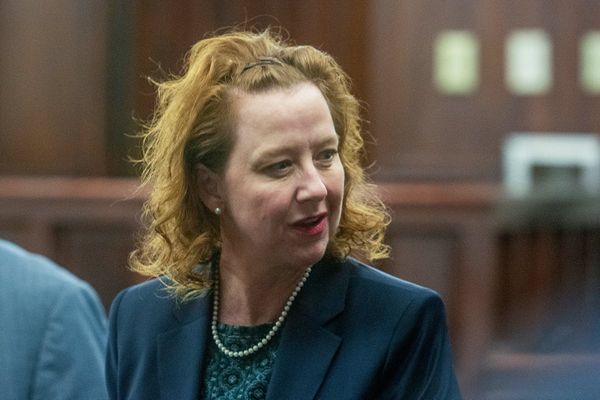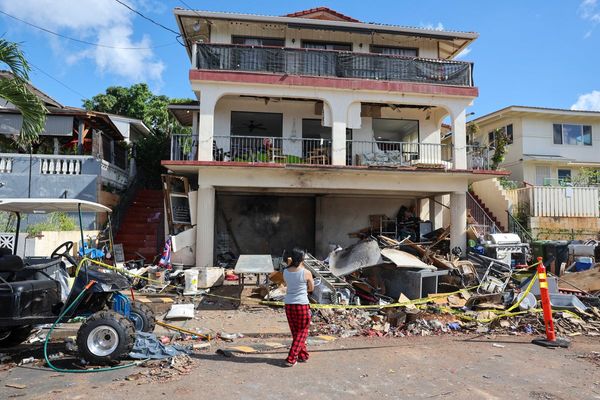
Almost a month after the Indonesian Island of Lombok was rocked by the first in a devastating series of earthquakes, the tourist haven remains a scene of destruction on a grand scale.
The clean-up has been delayed by almost 1,000 aftershocks that have shaken the region, including one magnitude 6.9, almost equivalent to the big quake that destroyed much of the north on August 5.
The ongoing tremors are also causing more death and destruction, with more than 430,000 people now displaced, 74,000 homes damaged or destroyed and 7,000 people injured.
The official death toll is now 515 and still rising.
The ABC spent two days travelling around Lombok and neighbouring Gili Trawangan and found many people still in need of assistance.
The vast majority of buildings throughout the north of the island are destroyed, damaged or uninhabited.
Hundreds of football fields, rice paddies and car-parks now serve as tent villages.
'We still need everything here'
Near the town of Pringgabaya, on the East of the Island, close to the epicentre of last week's 6.9 magnitude quake, a 17-year-old girl with suspected typhoid lay under a hot tarpaulin, hooked up to an IV drip.
Her mother said they had organised a doctor to see her, but hadn't been able to access any further care.
"The government hasn't sent us medics," said Ibu Susuryani. "There are children here who still need help."
"We need tarps, tents and daily needs like food and water. We still need everything here."
In North Lombok, baby Nur Rohma, who was born in a canvas field clinic three weeks ago, is now back in her mother's village, Akar Akar.
Under a blue tarpaulin in the midday sun, her mother Muliaynim used her hand to fan her baby from the heat.
"I feel very scared. I am scared that my baby is going to get sick because of the way things are," she said.
"We need tarps, bigger than the one we have so we can make a better tent … because our tent is so small and there are a lot of us."
"And maybe some milk or diapers, or other baby things for my baby."
Repairs and humanitarian efforts underway
A huge humanitarian effort, led by the provincial government, is now operating on the island.
Thousands of Indonesian police and military personnel are working to repair critical infrastructure.
But Indonesia has banned International Aid Organisations from operating directly in Lombok, forcing them to funnel donations through their local branches.
Australia has contributed $530,000 to the Indonesian branch of the Red Cross and donated hygiene and maternal kits and blankets via the United Nations Population Fund (UNFPA).
In the lead up to next year's election, a debate has raged, led by opponents of President Joko Widodo, over claims the President should have declared the scene a National Disaster, which would have opened the way for international aid to flow more freely from the start.
The Central Government has resisted the declaration, because the provincial government is still functioning.
But several other factors have also been cited, including the adverse impact a declaration would have on tourism and because Indonesia didn't want to be seen as "weak".
"When a disaster happens, not many countries are willing to declare a 'National Disaster' status as it shows the weakness of the country," said Indonesia's National Disaster Agency Spokesman Sutopo Nugroho.
"We want to show that we are capable of handling the natural disaster in Lombok … to show that Indonesia is a strong country, a tough country."
'Roller coaster of emotions'
In the absence of adequate relief in the first weeks after the August 5 quake, numerous local efforts to distribute aid sprung up.
Brendan Muir, who moved from Perth to open a hostel and nightclub on Gili Trawangan, spent $25,000 of his savings on food, water and delivery trucks.
A subsequent campaign on his Facebook page netted another $20,000.
Jaana Tigonen, from Finland, had been running a tiny charity with her husband when the earthquakes started.
Now her Pituq Foundation has swelled to a group of 50 employees, distributing food, water and basic needs to the more remote parts of Lombok.
"There were a lot of villages we reached and they were trying to save their water, trying to save everything they had," she said.
"It's been a roller coaster of emotions this past month."







